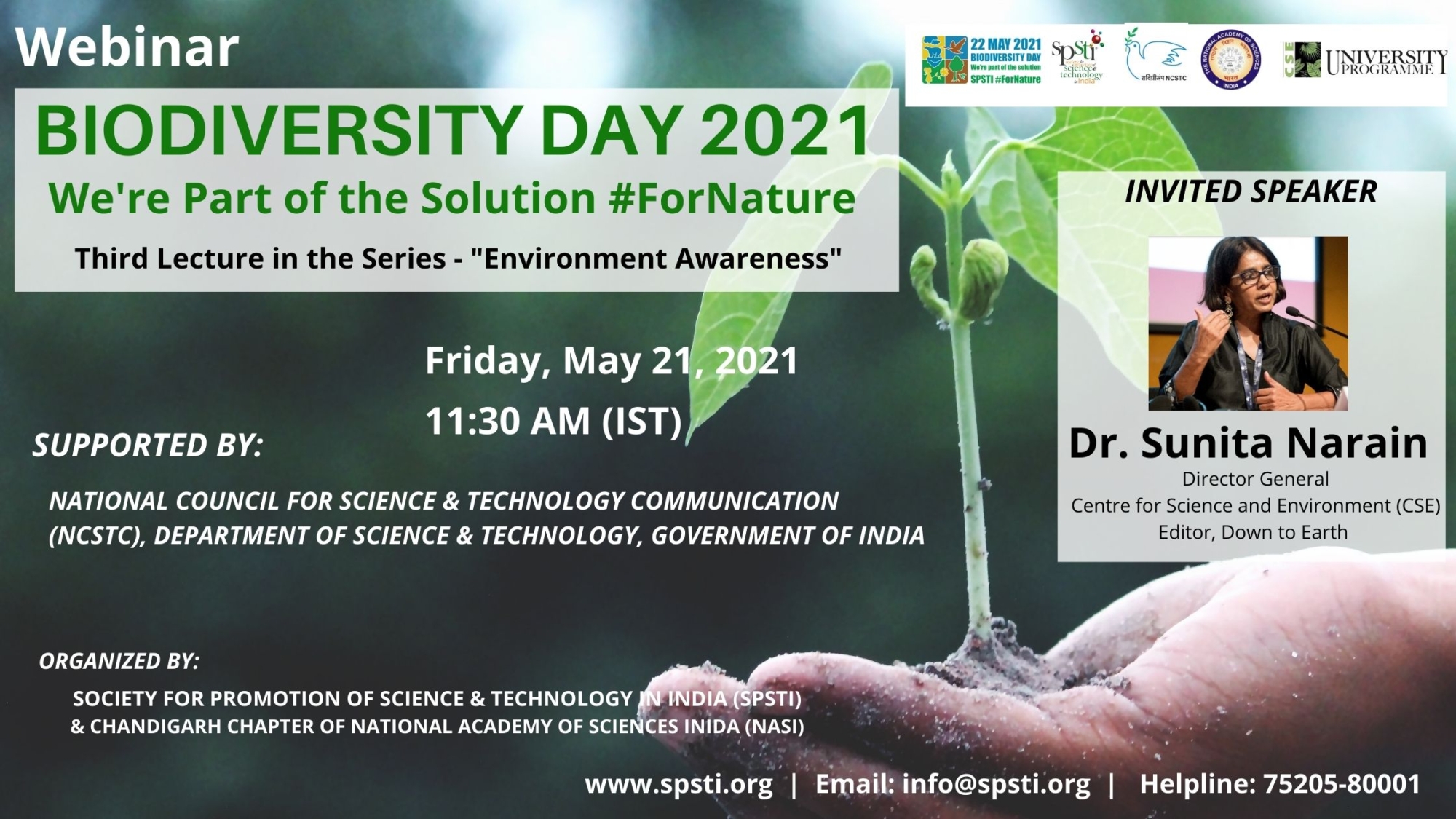The Society for Promotion of Science of Science & Technology in India (SPSTI), jointly with Chandigarh Chapter of the National Academy of Sciences India (NASI) with support from National Council for Science & Technology Communication (NCSTC), Department of Science & Technology, Government of India organized the third lecture in the series ‘Environment Awareness’ on May 21 to commemorate the International Day Biodiversity observed every year on May 22.
Dr. R. Baskar introduced the speaker Padma Shri Dr. Sunita Narain, Director General, Centre for Science and Environment (CSE) and Editor, Down to Earth and Stockholm water prize awardee in 2005. The title of the talk was “Biodiversity Day – We are Part of the Solution for Nature”. The session was attended by more than 250 participants on the zoom and about 185 viewed the same on the Facebook page of SPSTI.
The session steered with the introduction of the series by Shri Dharam Vir, IAS (Retd.) & President SPSTI, who welcomed the attendees and the speaker, Dr. Narain. While introducing about the Society, he said that the purpose of SPSTI is to take science to the public, especially students and youth.
Prof. Arun Kumar Grover, former Vice Chancellor of Panjab University and Vice President of SPSTI talked about the CSE as an influential NGO globally. Dr. Souparna Banerjee introduced about the CSE which was established in 1980 by Anil Aggarwal and its environment education work. He described the CSE as a public research and advocacy organisation which researches as focused on strategies which are sustainable and equitable. He said the world is facing a green challenge due to rapid industrialization which is leading to pollution, toxification and diseases and answer to these lies in working with local communities.
Dr. Narain started with sharing the report of the state of our environment, which includes what is happening in the ground, what is working and what needs to be changed. She said the solution for environmental management needs to be affordable and sustainable and which needs people’s participation. The 2021 report has a complete section on biodiversity that mentions great decline in biodiversity and main cause being the anthropogenic activities. She mentions it as a phase of mass extinction, including many species of birds, mammals, crustaceans, sharks and many more. This probably is the sixth phase of mass extinction.
She says biodiversity is about the relationship of humans with nature. She quoted the example of COVID-19 where RNA has caused the pandemic which may have been a zoonotic disease as the natural habitat is decreasing and mutation keeps on occurring. Similarly, the 30% of China’s pig industry is under threat due to swine flu. These changes have been due to our westernized model for conservation. Our conservation model should be based on rebuilding relationships with nature where local people are custodians of our nature. She advocated building an agriculture model which not only celebrates the cultural diversity of the nation but also the diversity in our food, which should reach our plates. Citing her experiences from tiger task force she said we need not only to relearn development but we also need to relearn conservation. She says the way we are protecting the wild has become ‘islands of conservation’. She talks about regenerating the forest habitats by investing in forest water and grassland economies, where local people must be involved. Sharing another report on the Business of Adulteration of Honey which was published in December 2020, she talked about the important role that bees play in pollination and increasing the productivity. She shared the sugar syrups in place of honey has badly affected not only the beekeepers’ business but also the biodiversity of bees is shrinking. Talking about the diversity, she shared many varieties of rice which can adapt to rising floods, have medicinal importance, drought and salinity resistant but they are being lost. She also advocated the need to protect the genetic diversity of many fruits and related it to the cultural biodiversity of the country, which needs to be related to food biodiversity and sustainability. For protecting such biodiversity there is a need to reinvent agriculture as green agriculture by understanding sustainability of what we grow, which needs to be biodiversity rich and nature friendly. She says sustainability is about growing local food for livelihood security which is less intensive and less toxic. She concluded her talk by stating we must remember sustainability is about what we eat, how we eat and what we do to value nature. There is a need to understand new challenges so we can meet the future going forward.
The session was much appreciated by the audience and followed with questions about zero budget farming, sustainable farming and food security, initiative people can make to connect with nature and also on need for building a good public health system. Prof. R.K. Kohli thanked the speaker as well as the attendees.

